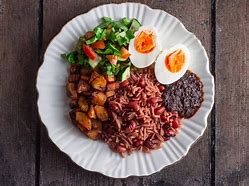Ghanaian cuisine is renowned for its rich flavors and cultural importance. However, some traditional dishes can contribute to excessive weight gain when consumed frequently or in large portions.
Understanding the nutritional content and preparation methods of these foods is vital for making informed dietary choices. Here are six Ghanaian meals that may lead to weight gain:
- Waakye with Multiple Sides
Waakye, a popular dish of rice and beans, becomes calorie-dense when served with sides like fried plantain, spaghetti, boiled eggs, fried fish, and shito. This hearty combination can result in a high-calorie meal, especially without adequate physical activity. - Fufu with Palm Nut or Groundnut Soup
Fufu, made from cassava and plantain, is often paired with rich soups like palm nut or groundnut soup. These soups are typically high in fat due to palm oil and meats, making large servings potentially fattening without sufficient exercise. - Kelewele (Spicy Fried Plantains) and Groundnuts
Kelewele, or spicy fried plantains, is a popular snack usually enjoyed with groundnuts. Both are calorie-rich; fried plantains absorb oil, and groundnuts are high in fats. Frequent evening consumption can lead to increased calorie intake. - Kenkey with Fried Fish and Pepper Sauce
Kenkey, a fermented maize dough, is typically served with fried fish and pepper sauce. While providing carbohydrates, the fried fish adds significant fat content. Large portions, especially at night, may contribute to weight gain. - Bofrot (Fried Dough Balls)
Bofrot, or puff-puff, is a deep-fried dough snack made from flour and sugar, resulting in a high-calorie treat. Regular indulgence without exercise can lead to weight gain. - Omotuo (Rice Balls) with Groundnut Soup
Omotuo, or rice balls, served with groundnut soup can be calorie-intensive due to the starchy rice and rich, oily soup. Frequent large servings may contribute to weight gain.
ICYMT: GPRTU Announces 15% Reduction in Transport Fares Effective May 25
Tips for Balanced Consumption:
- Portion Control: Be mindful of serving sizes to avoid excessive calorie intake.
- Cooking Methods: Choose grilling or boiling over frying to reduce fat content.
- Balanced Diet: Incorporate a variety of foods, including vegetables and lean proteins.
- Physical Activity: Engage in regular exercise to effectively manage weight.
By making conscious choices and balancing traditional dishes with healthier options, you can enjoy Ghanaian cuisine while maintaining your health goals.
SOURCE: PULSE GHANA




























